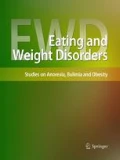Abstract
The aim of the study was to identify the predicting efficiency of some psychometric data on weight loss after behavior modification in moderately obese patients. A group of patients on a weight loss program with a moderately hypoenergetic diet plus behavior modification therapy for 24 weeks completed the Eating Inventory (EI), the Eating Disorder Inventory (EDI), the Body Shape Questionnaire (BSQ) and the Body Attitude Questionnaire (BAQ). Correlations between the pre-diet and post-treatment scores were evaluated by stepwise regression analysis. The weight loss percentage was positively correlated with the EDI Bulimia scale and the BAQ Feeling Fat, and negatively with the EDI Body Dissatisfaction and Interpersonal Distrust scores. These findings indicate the true effectiveness of the behavior modification technique employed to extinguish bulimic behaviors. Furthermore, it can be suggested that realistic attitudes towards own fatness with a strong motivation and a good relationship with the therapist guarantee a greater weight loss.
References
Stunkard A.J., Wadden T.A.: Psychological aspects of severe obesity. Am. J. Clin. Nutr., 55, 524S–532S, 1992.
Björvell H., Rössner S.: Long term treatment of severe obesity: Four year follow-up of results of combined behavioral modification programme. BMJ, 291, 379–382, 1985.
Wadden T.A: The treatment of obesity — An overview. In: Stunkard A.J., Wadden T.A. (Eds.), Obesity: theory and therapy, ed. 2. New York, Raven Press, 1993, pp. 1997–217.
Foster G.D., Wadden T.A., Swain R.M., Stunkard A.J., Platte P., Vogt R.A.: The Eating Inventory in obese woman: Clinical correlates and relationship to weight loss. Int. J. Obes., 22, 778–785, 1988.
Laporte D.J., Stunkard A.J.: Predicting attrition and adherence to a very low calorie diet: A prospective investigation of the Eating Inventory. Int. J. Obes., 14, 197–206, 1990.
Wilson G.T.: Psychological prognostic factors in the treatment of obesity. In: Hirsch J., Van Itallie T.B. (Eds.), Recent advances of obesity research. London, John Libbey, 1985, pp. 301–311.
Ferguson K.J., Brink P.J., Wood M., Koop P.M.: Characteristics of successful dieters as measured by guided interview responses and Restraint Scale. J. Am. Diet. Assoc., 92, 1119–1121, 1992.
Karlsson J., Hallgren P., Kral J., Lindros A.K., Sjöstrom L., Sullivan M.: Predictors and effects of long term dieting on mental well-being and weight loss in obese women. Appetite, 32, 13–26, 1994.
Smith M.C., Sondhaus E., Porzelius L.K.: Effect of binge eating on the prediction of weight loss in obese woman. J. Behav. Med., 18, 161–168, 1985.
Stunkard A.J., Messick S.: The Three-Factor Eating Questionnaire to measure dietary restraint, disinhibition and hunger. J. Psychosom. Res., 29, 71–83, 1985.
Garner M.G., Olmsted M.P., Polivy J.: Development and validation of a multidimensional eating disorder inventory for anorexia nervosa and bulimia. Int. J. Eating Disord., 2, 15–34, 1984.
Ben-Tovim D.I., Walker M.K.: The development of the Ben-Tovim Walker body attitudes questionnaire (BAQ), a new measure of women’s attitudes toward their own bodies. Psychol. Med., 21, 775–784, 1991.
Cooper P.J., Taylor M., Cooper Z., Fairburn C.G.: The development and validation of the Body Shape Questionnaire. Int. J. Eating Disord., 6, 485–496, 1987.
Pekkarinen T., Takala I., Mustajoki I.: Two years maintenance of weight loss after VLCD and behavioral therapy for obesity: correlation to the scores of questionnaires measuring eating behavior. Int. J. Obes., 20, 332–337, 1996.
Ficther M., Quadflieg N., Bradl B.: Recurrent overeating: an empirical comparison of Binge Eating Disorder, bulimia nervosa, and obesity. Int. J. Eating Disord., 14, 1–16, 1993.
Björnell H., Aly A., Langius A., Nordström G.: Indicators of changes in weight and eating behavior in severely obese patients treated in nursing behavioral program. Int. J. Obes., 18, 521–526, 1994.
Author information
Authors and Affiliations
Rights and permissions
About this article
Cite this article
Traverso, A., Ravera, G., Lagattolla, V. et al. Weight loss after dieting with behavioral modification for obesity: The predicting efficiency of some psychometric data. Eat Weight Disord 5, 102–107 (2000). https://doi.org/10.1007/BF03327485
Received:
Accepted:
Published:
Issue Date:
DOI: https://doi.org/10.1007/BF03327485

